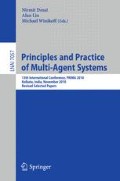Abstract
Scheduling of patients, staff, and resources for elective surgery in an under-resourced and overburdened public health system represents an inherently distributed class of problems. The complexity and dynamics of interacting factors demand a flexible, reactive and timely solution, in order to achieve a high level of utilization. In this paper, we present an Automated Scheduler for Elective Surgery (ASES) wherein we model the problem using the multiagent systems paradigm. ASES is designed to reflect and complement the existing manual methods of elective surgery scheduling, while offering efficient mechanisms for negotiation and optimization. Inter-agent negotiation in ASES is powered by a distributed constraint optimization algorithm. This strategy provides hospital departments with control over their individual schedules while ensuring conflict free optimal scheduling. We evaluate ASES to demonstrate the feasibility of our approach and demonstrate the effect of fluctuation in staffing levels on theatre utilization. We also discuss ongoing development of the system, mapping key challenges in the journey towards deployment.
Access this chapter
Tax calculation will be finalised at checkout
Purchases are for personal use only
Preview
Unable to display preview. Download preview PDF.
References
Australian Medical Association: Public Hospital Report Card 2009 (2009), http://ama.com.au/node/5030
Bordini, R.H., Wooldridge, M., Hübner, J.F.: Programming Multi-Agent Systems in AgentSpeak using Jason. John Wiley & Sons (2007)
Burke, D.A.: Exploiting Problem Structure in Distributed Constraint Optimisation with Complex Local Problems. PhD thesis, Department of Computer Science, University College Cork, Ireland (2008)
Chechetka, A., Sycara, K.: An Any-Space Algorithm for Distributed Constraint Optimization. In: AAAI Spring Symposium on Distributed Plan and Schedule Management (2006)
Fox, M.S., Allen, B., Strohm, G.: Job-Shop Scheduling: An Investigation in Constraint-Directed Reasoning. In: 2nd Conference of The American Association for Artificial Intelligence, pp. 155–158 (1982)
Friha, L.: DISA: Distributed Interactive Scheduler using Abstractions, PhD thesis, University of Geneva, Geneva (1998)
Jebali, A., Hadj Alouane, A.B., Ladet, P.: Operating Rooms Scheduling. International Journal of Production Economics 99(1-2), 52–62 (2006)
Jones, A., Rabelo, J.: Survey of Job Shop Scheduling Techniques. NISTIR, National Institute of Standards and Technology, Gaithersburg, USA (1998)
Khanna, S.: Distributed Constraint Optimization and Scheduling in Dynamic Environments. PhD Thesis, Institute for Integrated and Intelligent Systems, Griffith University, Australia (2010)
Khanna, S., Sattar, A., Hansen, D., Stantic, B.: An Efficient Algorithm for Solving Dynamic Complex DCOP Problems. In: 2009 IEEE/WIC/ACM International Joint Conference on Web Intelligence and Intelligent Agent Technology (WI-IAT 2009), Milano, Italy, pp. 339–346 (2009)
Khanna, S., Sattar, A., Maeder, A., Stantic, B.: Intelligent Scheduling in Complex Dynamic Distributed Environments. In: 12th World Congress on Health (Medical) Informatics; Building Sustainable Health System (Medinfo 2007), Brisbane, Australia, pp. 1665–1666 (2007)
Krempels, K., Panchenko, A.: An Approach for Automated Surgery Scheduling. In: 6th International Conference on the Practice and Theory of Automated Timetabling, Brno, Czech Republic, pp. 209–233 (2006)
Krempels, K., Panchenko, A.: Dialog-Based Intelligent Operation Theatre Scheduler. In: 6th International Conference on the Practice and Theory of Automated Timetabling, Brno, Czech Republic, pp. 524–527 (2006)
Lamiri, M., Grimaud, F., Xie, X.: Optimization Methods for a Stochastic Surgery Planning Problem. International Journal of Production Economics, Special Issue on Introduction to Design and Analysis of Production Systems 120(2), 400–410 (2009)
Lamiri, M., Xie, X., Dolgui, A., Grimaud, F.: A Stochastic Model for Operating Room Planning with Elective and Emergency Demand For Surgery. European Journal of Operational Research 185(3), 1026–1037 (2008)
Lass, R.N., Sultanik, E.A., Regli, W.C.: Dynamic Distributed Constraint Reasoning. In: 23rd AAAI Conference on Artificial Intelligence, Chicago, USA, pp. 1466–1469 (2008)
Modi, P.J., Shen, W., Tambe, M., Yokoo, M.: An Asynchronous Complete Method for Distributed Constraint Optimization. In: 2nd International Joint Conference on Autonomous Agents and Multiagent Systems, Melbourne, Australia, pp. 161–168 (2003)
Paulussen, T., Zöller, A., Rothlauf, F., Heinzl, A., Braubach, L., Pokahr, A., Lamersdorf, W.: Agent-Based Patient Scheduling in Hospitals. In: Multiagent Engineering, Theory and Applications in Enterprises, pp. 255–275. Springer, Heidelberg (2006)
Petcu, A., Faltings, B.: A Scalable Method for Multiagent Constraint Optimization. In: Nineteenth International Joint Conference on Artificial Intelligence, Edinburgh, Scotland, pp. 266–271 (2005)
Pham, D.N., Klinkert, A.: Surgical Case Scheduling as a Generalized Job Shop Scheduling Problem. European Journal of Operational Research 185(3), 1011–1025 (2008)
Prosser, P., Buchanan, I.: Intelligent Scheduling: Past, Present and Future. Intelligent Systems Engineering 3(2), 67–78 (1994)
Queensland Health: Quarterly Public Hospitals Performance Report March Quarter 2010 (2010), http://www.health.qld.gov.au/surgical_access
Rao, A.S.: AgentSpeak(L): BDI Agents Speak Out in a Logical Computable Language. In: Perram, J., Van de Velde, W. (eds.) MAAMAW 1996. LNCS, vol. 1038, pp. 42–55. Springer, Heidelberg (1996)
Woolridge, M.: Introduction to Multiagent Systems, 2nd edn. John Wiley & Sons (2009)
Zweben, M., Fox, M.: Intelligent Scheduling. Morgan Kaufmann, San Francisco (1994)
Author information
Authors and Affiliations
Editor information
Editors and Affiliations
Rights and permissions
Copyright information
© 2012 Springer-Verlag Berlin Heidelberg
About this paper
Cite this paper
Khanna, S., Cleaver, T., Sattar, A., Hansen, D., Stantic, B. (2012). Multiagent Based Scheduling of Elective Surgery. In: Desai, N., Liu, A., Winikoff, M. (eds) Principles and Practice of Multi-Agent Systems. PRIMA 2010. Lecture Notes in Computer Science(), vol 7057. Springer, Berlin, Heidelberg. https://doi.org/10.1007/978-3-642-25920-3_6
Download citation
DOI: https://doi.org/10.1007/978-3-642-25920-3_6
Publisher Name: Springer, Berlin, Heidelberg
Print ISBN: 978-3-642-25919-7
Online ISBN: 978-3-642-25920-3
eBook Packages: Computer ScienceComputer Science (R0)

